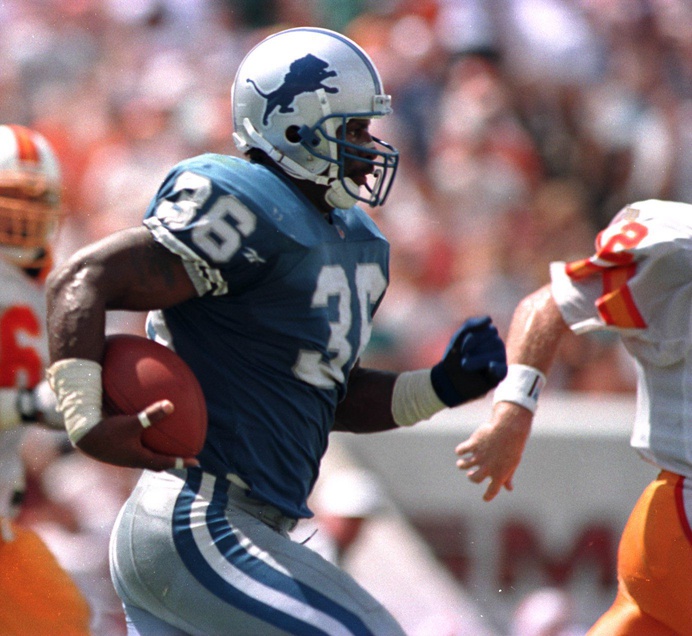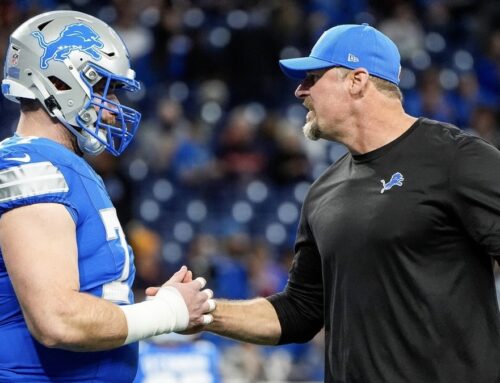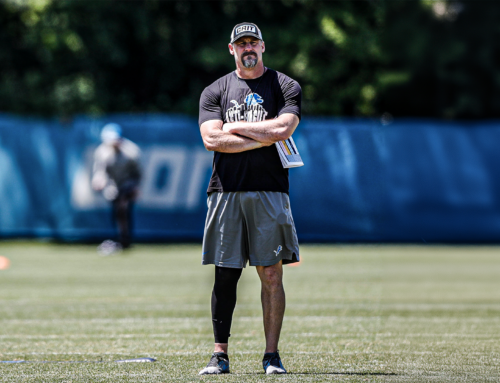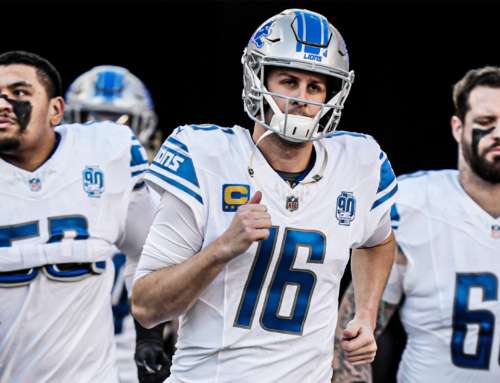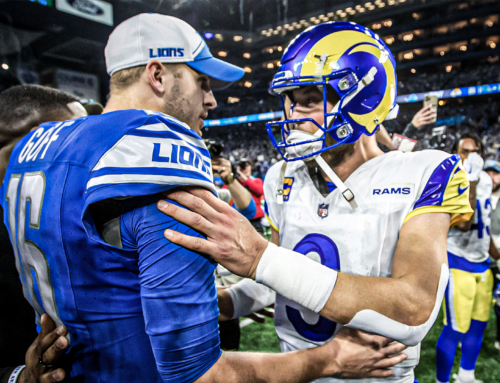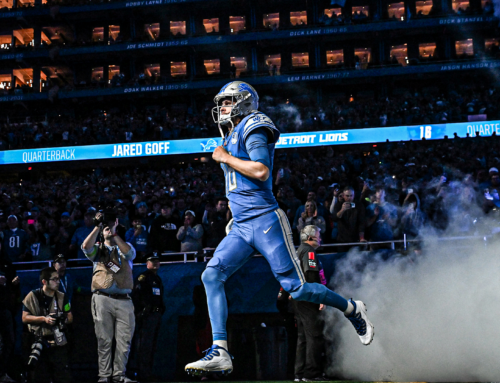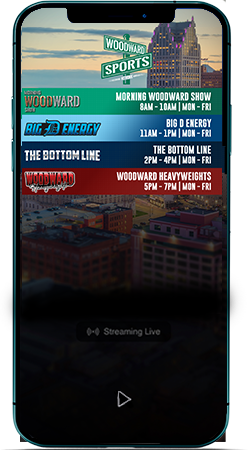Here is second part of Detroit Lions legend, Bennie Blades interview with Woodward Sports. In this portion, Blades discusses playing at Lambeau Field, Darry Rogers vs. Wayne Fontes, and his thoughts on the new look Lions.
Kory Woods (KW): I want to stick with your time as a Detroit Lion a little bit more. They will be going to Lambeau Field to face Green Bay for Monday Night Football. Because of that division rivalry, what did it mean to you and your teammates to face Green Bay at Lambeau?
Bennie Blades (BB): Every single year that you played Green Bay, I know back in the ’90s, and even right now, Green Bay’s going to be at the top of the division. For whatever reason, they slate them right there at the top of the division. They’re the team that you have to beat. And personally, I will never forget one December. I had the flu all week. That was one of the times I came to the complex, and they made me lay on the training table. They [had to]
get me ready for that Sunday. I had a temperature and everything. It didn’t matter, this is Green Bay, and we always know you got Green Bay. That’s why I don’t get it when people cannot get psyched up for the Green Bay Packers. Because growing up, I don’t care if you are a millennial. And when people talk about it, Green Bay Packers is title town.
Whether they’re having a down year or whether they’re having an up year. Just like they [NFL] put us [Lions] on TV on Thanksgiving, Green Bay’s always going to have two or three Monday night football games. People are always going to tune in to watch the Green Bay Packers. And I really want these young guys to understand the magnitude of playing the Green Bay Packers because you got to face them twice a year. And I’m sure this year is going to be a little bit more extra special because it may be Aaron Rodgers last year in Green Bay. They have to really know that they have to bring not only their A-game, but they got to bring the A, B, and your C- game.
You know, if you played a halfway decent game in the third or fourth quarter to San Fran, you got to keep that momentum going from the first throughout the fourth quarter when you’re playing Green Bay. And so, you better believe I’ll be in somebody’s bar somewhere with my Detroit Lions gear on. And I’m sure a whole bunch of cheese heads will be there. We got a whole bunch of them that live down in South Florida. And it doesn’t matter to me. I’ll be cheering just as loud for them to win.

KW: You already answered my other question that I was going to get into later on down the line regarding if you were still an avid Detroit Lions football watcher. And from everything you said so far in this interview, it seems like you are. So, I want to go into this last question on your career before going into the current regime. The Lions went through some tough times while you played for them. Did you hear that “Same Ole’ Lions” adage that many media and fans recite? And if you did hear it, what was the discussion amongst you and your teammates about that?
BB: Well, I went through it my first two years in the National Football League. And when you had a guy like myself, Lomas Brown, Jerry Ball, Chris Spielman, and the younger guys who were rookies and second-year guys, we wanted to show the city of Detroit that we got drafted here to be winners, not to be bottom dwellers. When we were, some teammates were like, “Ah, man, don’t worry about it. Just get your check on Tuesday.” Are you serious? Dude, I came from a Miami program where we lost four games in four years. And you would hear Chris [Spielman} say, I didn’t come here to be a loser or Jerry Ball or Norman Brown.
We didn’t come to Detroit Lions to be losers. We came so we could win ball games. And so when you hear guys who had been round there after the early ’80s when they were winning, then they went to that lull, guys just got complacent with the losing. It did take us as young guys to say, “You know what? Look, we got to win at all costs, man. We got to win now.” So when they made the coaching change, that was the biggest difference. People always say, “A coach doesn’t make that big a difference.” Yes, yes, it does.
There was a huge difference between Darryl Rogers, who wanted to leave and get up out of Detroit, and a Wayne Fontes. People are always saying Wayne Fontes was a player’s coach, and he let us do want we wanted to. No, no. He held us accountable, though. That’s the difference. As long as you are holding people accountable for what they do and what they do not do, you’re not going to get the admiration from the fans, but you’re definitely going to get it from the players.
KW: So the players, they admired Fontes more than Rogers?
BB: Oh, that’s an understatement. When I came in my rookie season, I called my mom, and I’ll never forget it. I called my mom halfway through the season, and I said that “If this is what NFL football is going to be like, I don’t want to play.” He didn’t care. He used to come in the huddle after practice, and he would ask us how many birds landed on the Pontiac Silverdome. Dude, I don’t care anything about that. What are you going to do this team to win? Birds laying on the Silverdome don’t mean anything to me. So when Wayne Fontes came in, it was totally different.
KW: You said Wayne held players accountable. What did Wayne specifically do that held players accountable?
BB: Everybody knew that Barry Sanders was going to be Barry Sanders. Barry could miss meetings. He wasn’t going to miss a practice, but if Barry missed a meeting, it was excused. If I missed tackles that were sure tackles, or I missed an interception, oh, trust me. Wayne would have a little Captain’s meeting, which I would go into the Captain’s meeting, and he would call me out in front of everybody. “You supposed how to be a captain, and this is what captains do? You have to play better.”
Now, you don’t want to hear that from the head coach. Those are the guys that tell management when you are supposed to get a raise. You know what I mean? So those things like that. And if he held captains accountable, I just imagined what he did with guys that really he didn’t want there. Because personally, I’ve seen certain young men who should’ve still been on the team and got cut.
Now I leave that alone because it was his team, and he had to build the way he saw fit. Yeah, it all worked out, but that doesn’t mean that he was softened for us because we used to hear it all the time. “Aww man, Wayne Fontes, gotta go. Wayne Fontes gotta go.” But he is probably one of the two winningest coaches in Detroit Lions history. Look up his stats. The fans ran him up out of town. But he knew how to motivate players that he did embarrass them in his public media. Because when he called you into his office, he just let you know, “Not a problem. If this right here continues to happen, you won’t be a Detroit Lion again. So you either shape up or ship out. Bottom line.”

KW: I want to talk about the new regime, the new-look Lions. The team made the change last year, letting go Bob Quinn and Matt Patricia simultaneously, and they’re trying to complete a 180 with Sheila Ford Hamp now as their principal owner. They’ve brought in Dan Campbell as the new head coach. And at his first press conference, he got a lot of attention when he talked about the kneecaps and how physical he wanted the team to be. What are your early thoughts and impressions on Dan Campbell? He spoke about the level of physicality he wants his team to play with. How did that make you feel?
BB: Well, the first impression made me feel extremely proud that we’re going to get back to the old “black and blue division.” When I say “black and blue division,” people are like, well, they don’t do that anymore. But if you notice, he’s running the ball a lot more than they have in the past. Now, do I want his defense to be more physical? I sure do. Because I was like, “Wow, they really aren’t hitting anybody.” But it goes back to the first question. How do you if you’re not practicing tackling? Those things have to be done in practice, but when you can only have eight physical practices the whole year, it isn’t happen on game day. It’s just not going to happen.
You can roll one of them rubber donuts out there and say, okay, tackle this, but that rubber donut or whatever they call it ain’t running full steam straight at you. Those things have to be taught through practicing, so when he talks about being physical? Nah, bro, you have to in hours put in. You’ve got to want to knock the snot out of his nose, every single play. Ain’t no talking about, “Well, I’m going to take it easy,” because no, bro, I don’t like you. I don’t want you to like me. I ain’t out here to be your friend when we step between these white lines. That ain’t what I’m all about. Now, I’m going to hit you with the cruelest intentions that I have in my heart because these guys, they go out there, I don’t know, maybe it’s just me. It’s almost like the slide to the side like, “Oh, I ain’t going to get myself hurt. If I tackle him and he falls down, that’s good, it’s not, so be it.”
We were making 80 to a hundred thousand dollars. I was going to knock your whole head off for my salary. I guess it’s different when you’re making 20 million a year. “I ain’t fixing to get hurt bad. I got to keep this income coming in.” We traded dollars for physicality. I understand the game has evolved, but when will we start rewarding those who play the game the right way?
KW: Have you ever met Dan Campbell? And just can you explain more about your impression of him?
BB: Well, just observation-wise, he seems like a very, very, very intense coach. You can see him. He mouths words. When the camera’s on him, you see him over there just mouthing words. He wants those guys to play with physicality, but how do you get that? Mike Singletary could not coach NFL football today. That’s why he’s down on the collegiate level. He would have a fit if guys weren’t tackling the right way. So that’s why a lot of the coaches that coach a game and coach physicality don’t last in the national football league. They just don’t. I don’t know if Dan Campbell’s going in line, but I want him and his team there to bring back the black and blue. Let me just bruise you every time I hit you. I didn’t even leave bruises on the skin.
KW: That “black and blue division” means a lot to you.
BB: It really does. If you think about it, how was the Superbowl won last year? They won defensively. Tampa Bay’s defense just got after Kansas City. You win championships by having championship-style defense. You can score all the points in the world, but if you score 42 and the defense gives up 45, it ain’t going to work.
KW: One of your former contemporaries from when you played, Aaron Glenn, he’s now the defensive coordinator. I don’t know how much you’ve bumped shoulders with him, but just from knowing him during playing days and seeing him as a player, what do you think he will be instilling in that defense?
BB: He’s putting the guys in situations where they can be successful. That’s the first thing I noticed. I didn’t see any blown coverages. He’s allowing the guys, even in man-to-man coverage, to be successful. Guys are not left out on an island where the quarterback has eight seconds to throw the ball. So as a play-caller, he’s being a little bit more aggressive. Now, is that going to transcend to the guys being a little bit more aggressive? I’m hoping so because when you out there, and you’ve put in man-to-man, me vs. you. I’ve got to put my hands on you to make sure, in man-to-man, that you don’t get that free release. So those are things that I like thus far. I’m hoping he will continue that.
KW: I want to round things out with this last question, and it’s about the sideline confrontation between Jeff Okudah and secondary coach Aubrey Pleasant. The Fox cameras caught it, and Pleasant was Okudah’s face, coaching him hard to where Tracy Walker had to check on the two during it. The players have come out and said that that was much of nothing. Dan Campbell downplayed it as well. What are your thoughts on some of the national media trying to blow this up into a big situation? Former NFL player Steve Smith made a big deal about it. What are your thoughts when you see a sideline confrontation between a player and a coach blown up like that?
BB: In today’s game, there are cameras everywhere. If there were cameras everywhere in the 60s, 70s, 80s, and early 90s, the coaches used to call you every name in the book. To me, it’s just coaching a kid to where he needs to be accountable. That’s the bottom line. I need to hold you accountable. I said that last year when I was on folk’s podcast. I love Mr. Okudah, but as the third pick in the draft, you have to be accountable, bro, and I’m glad when there’s a coach that’s holding kids accountable. You can’t go out and say, “Ah, man. My bad. My bad.” No, no, no, bro. That’s how that goes. You have to go out and work your ass off to make things happen. If the camera happens to catch a coach getting into your backside because you’re not doing what you’re supposed to do, I applaud that coach. He needs to get in his butt if he ain’t doing the right thing.
To read the first part of Blades’ interview with Woodward Sports, click here. Follow Kory Woods on Twitter at KoryEWoods.

